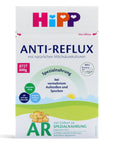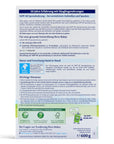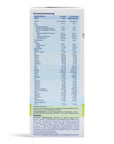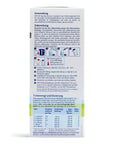




similar formulas
HiPP Anti Reflux
Specialty European Baby Formula

For ages
From: in 16-pack
Unit size:
Yields: of ready-made formula
+ FREE SHIPPING!
BEST DEAL!
+ Canadian import duties according to this table
skimmed milk, whey products, vegetable oils (palm oil*, rapeseed oil, sunflower oil), lactose, thickener locust bean gum, fish oil, potassium chloride, choline, mortierella alpina oil, calcium carbonate, calcium chloride, sodium citrate, l-phenylalanine, sodium selenite, l-tyrosine, zinc sulfate, calcium orthophosphate, l-leucine, l-tryptophan, l-histidine, iron sulfate, stabilizer lactic acid, potassium iodate, vitamin c, natural lactic acid cultures (limosilactobacillus fermentum hereditum®) 1, vitamin e, niacin, pantothenic acid, copper sulfate, vitamin b1, vitamin a, magnesium carbonate, inositol, vitamin b6, metafolin® (calcium l-methylfolate), vitamin k, vitamin d, biotin, vitamin b12.
Your order will be processed within 2 business days and then promptly shipped out. All shipments are handled by UPS Express.
Shipping typically averages between 2-5 business days.
Please note that we are not responsible for any taxes and or duties that may be charged by the carrier before arrival at your destination.
similar formulas
WHY DO BABIES LOVE HiPP Anti Reflux AR FORMULA?
European Organic Farms

About HiPP
your baby deserves the best

Frequently Asked Questions
-
HOW TO PREPARE HIPP ANTI-REFLUX?
To prepare HiPP anti-reflux formula: Boil fresh water and cool to 122°F (50°C) for about 45 minutes. Pour required amount of water into a sterilized bottle. Add correct number of level scoops of powder (1 scoop per 1 fl oz of water). Close bottle, roll between palms for 5 seconds, then shake for 20 seconds. Let stand for 7 minutes to thicken. Shake again until evenly distributed. Cool to drinking temperature (98.6°F/37°C) under cold running water. Test temperature before feeding. Use a single-hole, fast-flow teat. Prepare fresh for each feed and discard any leftovers. Always follow package instructions and consult a healthcare professional before use, as this is a special medical formula.
-
WHAT IS THE DIFFERENCE BETWEEN ANTI-REFLUX AND COMFORT FORMULA?
Anti-reflux formula is specifically designed to reduce baby's reflux and regurgitation by using a thickening agent that helps keep milk in the stomach, while comfort formula targets digestive issues like colic and constipation through more easily digestible, partially hydrolyzed proteins. Anti-reflux formula uses regular milk proteins and adds a natural thickener, whereas comfort formula typically contains hydrolyzed whey protein, reduced lactose, and added organic fiber to ease digestion. Both formulas aim to improve infant feeding comfort, but they address different specific digestive challenges. The key difference lies in their composition and primary purpose: anti-reflux formula prevents spit-up, while comfort formula helps with overall digestive sensitivity. Always consult a pediatrician to determine the most appropriate formula for your baby's specific needs.
-
DOES HIPP ANTI-REFLUX HAVE PROBIOTICS?
HiPP German Anti-Reflux formula contains both prebiotics and probiotics to support digestive health. It includes natural prebiotics (galactooligosaccharides from organic lactose) and probiotics (Lactobacillus fermentum hereditum), which closely resemble those found in breast milk. The formula also contains organic locust bean gum, a natural thickening agent that helps reduce reflux and regurgitation. Additionally, HiPP German AR formula is made with organic skimmed cow milk, includes omega-3 and omega-6 LCPs (DHA and ARA) for brain and eye development, and is free from GMOs, added sugars, corn syrup, gluten, soy, and artificial preservatives or flavorings. This specialty formula is designed to be easily digestible and is suitable for infants from birth onwards, helping to regulate reflux while providing complete nutrition.
-
HOW LONG SHOULD MY BABY BE ON ANTI-REFLUX MILK?
Anti-reflux formula should typically be used for a limited time, usually no longer than 6 months, and only under medical supervision. Most infants outgrow reflux by their first birthday, with 90% showing improvement before then. Your healthcare provider should guide you to periodically attempt reintroducing standard formula, often on a monthly basis, to check if your baby has overcome reflux. A good indicator that your baby might be ready to transition back to regular formula is if they can drink water without issues. If reflux symptoms persist despite using anti-reflux formula, consult your doctor as medication might be necessary. Always follow your healthcare provider's advice, as each baby's needs are unique, and monitor your baby's progress closely.
-
HOW TO KNOW IF BABY HAS REFLUX?
Reflux in babies can be identified through several signs, including frequent spitting up of milk during or after feeds, difficulty feeding (refusing feeds, gagging, or choking), persistent hiccups or coughing, excessive crying (especially during or after feeding), arching of the back, irritability associated with regurgitation, poor weight gain, swallowing or gulping after burping or feeding, and colic-like symptoms. While some degree of reflux is common and often harmless in infants, persistent or worsening symptoms, or concerns about feeding or growth, warrant consultation with a pediatrician. It's important to note that not all babies with reflux will show all these signs, and the severity can vary. Professional medical evaluation is crucial for proper diagnosis and management.










